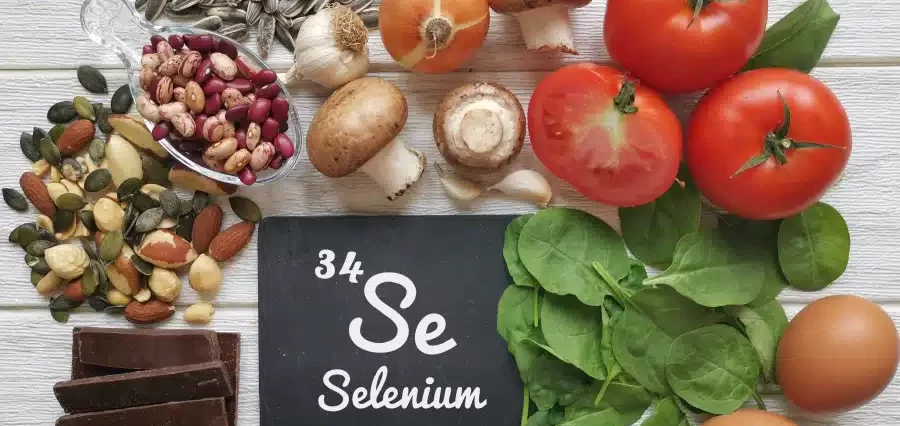Top Selenium-Rich Foods
Struggling to keep your health in check? Selenium is a powerhouse nutrient that many of us overlook. This article unpacks the top selenium-rich foods, offering you easy ways to boost this vital mineral in your diet.
Dive in and nourish your body!
Key Takeaways
-
- Brazil nuts have lots of selenium, and eating just a few can give you more than you need daily.
-
- Foods from the ocean, like tuna, oysters, and shrimp, are full of selenium, which is good for your body in many ways.
-
- Meat like pork, beef, and chicken have a lot of selenium, and they also give you protein.
-
- You can find selenium in enriched grains such as wheat and oats. This helps people who don’t eat meat or seafood get enough selenium.
-
- Dairy products like milk, cheese, and yogurt add to the amount of selenium you get from food each day.
What is Selenium and Why Do We Need It?

Selenium is a trace element and essential nutrient that supports good health. It is necessary for proper functioning of the immune system, thyroid gland, and heart health.
Trace elements and essential nutrients for good health
Selenium acts as a shield for your cells. It helps fight off things that can hurt them, such as pollution and sun rays. You don’t need much selenium, but having enough in your body to stay healthy is super important.
Eating foods high in selenium strengthens your immune system and ensures your thyroid works right. The thyroid controls how fast or slow our body’s parts should work.
To avoid not getting enough selenium, you must eat foods full of it. Even though we only need a tiny bit, having too little can make you feel tired or cause muscle weakness.
Keep in mind that soils around the world have different amounts of this nutrient. This means the same food might have more selenium if it grows in one place than elsewhere.
Top 15 High-Selenium Foods

Include a variety of selenium-rich foods in your diet to ensure you meet your daily requirements and reap the health benefits. To discover more about these high-selenium foods, keep reading!
Brazil nuts
Brazil nuts pack a powerful punch of selenium. Just one ounce can provide much more than the daily value needed. They are an excellent source and easy to add to your diet.
These nuts come loaded with protein, fiber, and important vitamins like thiamine and minerals such as copper.
Their high selenium content means Brazil nuts fight inflammation well. Eating them helps boost your intake of phenolics, flavonoids, tocopherol, phytosterols, and squalene. People looking to up their selenium levels would do well by snacking these tasty treats or adding them to salads or yogurts.
Brazil nuts are a smart choice for those thinking about heart health or trying to support their immune system.
Seafood (tuna, oysters, shrimp)
Seafood lovers, take note! Tuna, oysters, and shrimp are more than just tasty. They’re packed with selenium, too. This mineral is key for your health. Just one serving of these seafood favorites can give you a big boost of the nutrients you need.
Eating tuna, oysters, or shrimp puts selenium into your body. Why does this matter? Selenium helps your immune system stay strong and ensures your thyroid works right. Plus, it’s good for keeping your heart healthy.
So enjoy some seafood to get these benefits!
Meats (pork, beef, chicken)
Pork, beef, and chicken are top sources of selenium. Grass-fed beef is particularly rich in both selenium and zinc. Pork and beef are among the top 10 foods with the highest selenium content.
Including these meats in your diet can help you meet your daily selenium needs, supporting essential bodily functions like immune system health and thyroid function.
Selenium levels in meat can vary depending on factors such as animal feed and farming practices, but they remain a significant dietary source of this vital nutrient. Incorporating high-selenium meats into your meals provides a good source of protein and a boost to your overall health through sufficient selenium intake.
Enriched grains
Enriched grains, like wheat and oats, are an excellent source of selenium. They contribute to the list of top 15 high-selenium foods and offer a plant-based option for obtaining this essential mineral.
Enriched grains provide an easy way to incorporate selenium into your diet, especially for those who may not regularly consume animal products or seafood. Including enriched grains in your meals can help you meet your recommended dietary allowance for selenium while enjoying various nutrient-rich foods.
Enriched grains supplement the diverse array of selenium sources, offering individuals a flexible choice to enhance their nutritional intake without solely relying on animal products or seafood.
Dairy products
Dairy products like milk, cheese, and yogurt are among the top 15 high-selenium foods. They contribute to the substantial selenium content in our diet, along with nuts, seeds, fish, meat, brown rice, and eggs.
While the amount of selenium in dairy products can vary, they are still recognized as an essential source of this vital nutrient. In addition to providing nutrients like calcium and protein, dairy products also offer selenium content that supports overall health.
Moreover, including dairy products in your diet can help ensure a steady intake of selenium without relying solely on other sources like nuts or meats. Whether it’s a glass of milk with breakfast or adding yogurt to your snacks or meals, incorporating dairy into your diet is an easy way to boost your selenium intake.
Additional Sources of Selenium
Fish, such as yellowfin tuna, and vegetarian options like mushrooms and whole wheat pasta are also great sources of selenium for those looking to add variety to their diet. Want to learn more about the benefits of including these selenium-rich foods in your meals? Keep reading!
Fish, such as yellowfin tuna
Yellowfin tuna is a great source of selenium, providing about 92 mcg in a three-ounce serving. It’s among the top seafood options rich in this essential nutrient, contributing significantly to our daily intake.
Yellowfin tuna offers selenium and packs other vital nutrients, making it an excellent addition to a balanced diet for overall health and wellbeing.
Vegetarian options like mushrooms and whole-wheat pasta
Mushrooms are a great vegetarian source of selenium, providing about 12 mcg in a 100-gram serving. They offer selenium and contain other essential nutrients like Vitamin D and antioxidants.
Additionally, whole wheat pasta can be an excellent choice for obtaining selenium in a vegetarian diet, as it is associated with additional sources of this vital mineral.
Including these foods in your diet can help meet the body’s need for selenium and contribute to overall health. While animal products are often highlighted as high-selenium foods, incorporating mushrooms and whole wheat pasta can be equally beneficial, especially for individuals following a vegetarian or vegan diet.
Benefits of Including Selenium-Rich Foods in Your Diet
Including selenium-rich foods in your diet can boost your immune system, support thyroid function, and promote heart health. Keep reading to learn more about the importance of selenium and its impact on overall health!
Boosts immune system
Selenium is a vital mineral that helps boost the immune system, acting as an antioxidant and fighting inflammation. Including selenium-rich foods in your diet can enhance your body’s defenses and protect against free radical damage.
This essential nutrient supports overall immune function, helping your body stay strong and healthy.
Consuming selenium-rich foods such as Brazil nuts, seafood, meats, enriched grains, and dairy products supports your immune system against harmful external factors.
Supports thyroid function
Selenium plays a crucial role in supporting your thyroid function. It helps convert the thyroid hormone into active form, important for maintaining a healthy metabolism and regulating energy levels.
A selenium deficiency can impair your thyroid and metabolism, so including selenium-rich foods in your diet is essential to ensure proper thyroid support.
Remember that selenium works with iodine, another essential nutrient for thyroid health. Together, they help maintain the normal functioning of your thyroid gland and support overall metabolic processes.
Promotes heart health
Selenium may play a crucial role in promoting heart health. Low levels of selenium have been linked to an increased risk of heart disease, emphasizing the importance of maintaining adequate selenium intake for cardiovascular well-being.
Considering selenium-rich foods into your diet or considering selenium supplements could reduce the risk of cardiovascular diseases, providing another incentive to prioritize this essential mineral in your nutritional choices.
With its potential benefits on heart health, ensuring sufficient selenium intake through a balanced diet can be a proactive step towards supporting overall wellness.
By including high-selenium foods such as Brazil nuts, seafood (like tuna and shrimp), meats, enriched grains, and dairy products in your daily meals, you can take significant strides toward maintaining optimal heart health.
FAQs
Q: What are the top selenium-rich foods?
A: Foods such as Brazil nuts, sunflower seeds, fish (tuna, halibut, sardines), shellfish (oysters, mussels, shrimp), meat (beef, lamb, turkey), and grains (rice, wheat) are considered to be excellent sources of selenium.
Q: How much selenium do I need per day?
A: The recommended daily allowance of selenium for adults is 55 mcg (micrograms) daily.
Q: What are the best sources of selenium?
A: Some of the best sources of selenium include Brazil nuts, seafood, such as fish and shellfish, beef liver, sunflower seeds, and grains like brown rice and wheat.
Q: Is selenium supplementation necessary?
A: Obtaining selenium from natural food sources rather than supplements is generally recommended unless advised by a healthcare professional due to a selenium deficiency.
Q: What are some high selenium foods?
A: Foods like Brazil nuts, sunflower seeds, fish, shellfish, beef liver, and whole grains are high in selenium.
Q: What is the selenium content of brown rice?
A: Brown rice provides about 19 mcg of selenium per one-cup serving, making it a good source of this essential mineral.
Q: How do I know if I need selenium supplementation?
A: One way to determine if you need selenium supplementation is to consult a healthcare professional who can assess your dietary intake and potential risk factors for selenium deficiency and recommend appropriate supplementation if needed.
Q: Is selenium toxicity a concern with selenium-rich foods?
A: While selenium toxicity is rare from dietary intake alone, it’s important to be mindful of the selenium levels in soil and the content of food to avoid excessive selenium consumption. It’s always best to obtain selenium from a balanced diet.
Q: Why is selenium an essential mineral?
A: Selenium is an essential trace element that plays crucial roles in various bodily functions, including supporting the immune system, thyroid function, and antioxidant defense. It also works with other nutrients like vitamin E and omega-3 fatty acids.
Q: What do the National Institutes of Health say about selenium-rich foods in the diet?
A: The National Institutes of Health emphasizes the importance of obtaining selenium from a balanced diet and highlights selenium-rich foods as valuable sources of this essential mineral for maintaining overall health.

